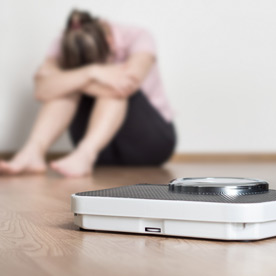
Weight is a big issue these days, with more than one in four UK adults currently classed as obese and a further 36 per cent overweight (i). Yet we don’t often hear about the problem of being underweight, possibly because it affects far fewer of us (around two per cent of men and two per cent of women (ii)).
One of the problems of being underweight, however, is that you’re not getting all the nutrients you need to stay healthy.
Am I underweight?
While things have improved a little during the past few years, the media is still full of images of underweight adults, particularly young women – so much so that many of us may recognise underweight as normal. Just as it’s not always easy to know whether you’re overweight, it can be hard to gauge whether or not you’re underweight simply by looking at the number on your bathroom scales. The answer is in your body mass index, or BMI.
How do I calculate my BMI?
BMI is a measurement that takes your height as well as your weight into consideration:
-
if your BMI is between 18.5 - 25, you’re considered to be of normal or ideal weight
-
BMI 25 - 30 is overweight
-
BMI 30+ is obese
-
BMI 18.5 or lower is underweight
According to Patient UK, in addition to these categories a BMI of between 18.5 - 20 means you’re a bit underweight and can’t afford to lose any more (iii).
You can work out your BMI yourself: take your weight in kilograms and divide it by the square of your height in metres (Kg/M2). Alternatively there are several trusted online BMI calculators you can use where you just have to input your weight and height (and sometimes a few other factors), such as the BMI Calculator at Patient UK, and the BMI health weight calculator at nhs.uk.
Limitations of BMI
While BMI offers a good estimate of whether or not your weight is healthy, there are some people for whom it may not be as accurate as for others, including:
-
Children (healthy weight in children is better assessed by using the centile charts)
-
Pregnant women (BMI categories don’t apply if you’re pregnant)
-
Body builders, athletes and people with high levels of muscle mass and low levels of body fat
-
Older people (those aged 65 and over)
-
People of Asian origin (some Asian people may be classed as overweight if they have a BMI of 22 - 25 and obese with a BMI of 26 - 31 because they have health risks that start to increase at a lower BMI than that of Caucasians; however BMI values that define underweight are considered the same for all ethnicities)
What causes low body weight?
If you are naturally slender – and always have been – it’s likely being underweight isn’t a problem for you, at least when it comes to your health.
You may, for instance, have a low BMI because you’ve inherited certain physical characteristics from your parents, or you may be one of those rare people with a naturally very high metabolism. Meanwhile people who are very active, either because they are athletes or they have a job that’s extremely physically demanding, may burn so many calories during a normal day that they find themselves in the underweight BMI category, however much they eat.
If you’re otherwise healthy and have a well-balanced, nutritious diet, you shouldn’t usually have to worry about not being able to gain much weight. It’s simply normal for you to have a lower BMI than other people.
But in many cases being underweight is far from normal and may be linked to a health problem, such as one of the following:
Malnutrition
According to Patient UK, more than three million people in the UK are malnourished or at risk of malnutrition (iii). These mostly include elderly people and those with long-term health problems, including one in three people going into hospital or care homes (iii). However it’s also possible to be malnourished when your BMI isn’t in the underweight range – if, for instance, you’ve been ill and have been eating poorly.
Malnutrition doesn’t just mean you’re not eating well enough to maintain a healthy weight. It also means you’re probably not getting enough of the key nutrients your body needs to operate normally. Over time this can cause a range of problems including low energy, frequent infections and minor illnesses, dry skin, thinning hair or hair loss, and irregular or skipped periods in women.
Poor appetite
It goes without saying that your weight will drop if you lose your appetite for any reason. If you normally have a healthy appetite, any sudden change can be caused by a number of issues, such as taking certain medications (some antibiotics, opioid painkillers, antidepressants and chemotherapy drugs, for instance) as well as some physical health and mental health conditions (read on for more details). Getting older can affect your appetite too, which may explain why so many older people are affected by malnutrition.
If you’re experiencing a sudden change in appetite, see your GP, as treating any underlying condition (or changing any medication that’s putting you off eating) should see your appetite return to normal.
Overactive thyroid
One of the most common health conditions that causes unintentional weight loss is having an overactive thyroid gland. Also called hyperthyroidism, this is when your thyroid gland produces too much thyroid hormone (thyroxine), which triggers a range of symptoms – one of which is losing weight, even with an increased appetite.
Find out more about hyperthyroidism and how it’s treated by reading our guide to thyroid disorders and remedies.
Digestive health problems
Several health conditions that affect your digestive system can cause unintentional weight loss because you may not be absorbing your food properly, including coeliac disease, Crohn’s disease and ulcerative colitis. If you have irritable bowel syndrome (IBS) you may also not always feel like eating much as you may feel it helps keep your symptoms at bay.
Type 1 and type 2 diabetes
Sudden unintentional weight loss can be a sign of diabetes because the body starts burning fat and muscle for energy when it doesn’t produce enough insulin to help glucose get into its cells. This is more common in people before they have a diagnosis of type 1 diabetes, though it can affect people with type 2 diabetes too. Treating the condition can often result in your weight returning to normal. If you have poorly controlled diabetes you may find you have a smaller appetite too, thanks to a condition called gastroparesis (this is where nerve damage makes food pass through the stomach more slowly than usual).
Mental ill health
It’s not uncommon to experience unintentional weight loss if you have a mental health problem too, such as depression, anxiety, stress or obsessive compulsive disorder. This is usually because if you’re mentally unwell it can affect your ability to eat healthily as well as affect your appetite.
Eating disorders
Disorders such as anorexia and bulimia are serious mental health conditions that typically cause a low BMI. People with anorexia, for instance, aim to keep their weight as low as possible by eating very little, extreme exercising or both. Find out more by reading our guide to types of eating disorders and how to treat them.
Body dysmorphic disorder (BDD)
Also called body dysmorphia, BDD is a mental health condition that makes you spend a lot of time worrying about your appearance and seeing things wrong with it that others barely even notice. For instance, someone with BDD may see themselves as carrying excessive weight even when their BMI is normal and healthy. This can make them restrict the amount of food they eat in an attempt to achieve what they see as a normal weight – though to others, when this happens they will often appear underweight.
Dementia
According to Alzheimer’s Society many people with dementia lose weight because eating and drinking become more difficult as the disease progresses (iv). However this usually happens during the later stages of dementia, rather than before the condition is diagnosed.
Parkinson's disease
Some people with Parkinson’s disease lose weight for a number of reasons. For instance, a gradual loss of your sense of smell and taste is a known Parkinson’s symptom, as are swallowing difficulties – both can cause problems with eating. Depression is a common symptom too, plus some medicines that treat Parkinson’s can cause nausea. Other conditions can also cause a loss of smell and taste, including COVID-19.
Alcohol misuse
Many people who drink more than the recommended safe amount of alcohol may actually find it more difficult to lose weight, since the alcohol they drink adds to their overall daily calories (for instance, according to the charity Drinkaware a pint of beer can have as many calories as a Mars bar (v). But if you have a problem with alcohol dependency you may lose weight rather than gain it, largely because you lose interest in food. To drink safely, stick to the government’s guidelines of 14 units of alcohol each week. Find out more, including how to tell you have a problem with alcohol, by reading our guide to alcohol misuse.
Chronic pain
Any condition that causes chronic pain – such as headache, migraine, arthritis, back pain, fibromyalgia and trapped nerve conditions (for instance sciatica, trigeminal neuralgia and occipital neuralgia) – can make your weight drop because you may lose all interest in food when you’re experiencing pain. Some pain relief medicines can also make you lose your appetite.
What are the health risks of being underweight?
While being overweight has many implications for your health, so does being underweight. If you’re underweight because you’re malnourished, you may not be getting the right amount of nutrients from food to keep you healthy. Nutrient deficiencies can, for instance, cause anaemia, which can make you feel tired and light headed and cause other symptoms such as breathlessness, dry skin, thinning hair and heart palpitations (see our guide to anaemia and iron deficiency to find out more about the symptoms and treatments).
Some of the other health conditions that are linked with being underweight include the following:
Osteoporosis
Having a low body weight is thought to increase the risk for low bone mineral density, which makes bones more brittle and susceptible to breaking.
Fatigue
If you’re underweight because you’re not eating enough you may not be getting the calories you need to produce enough energy.
Infertility
Women who are underweight have an increased risk of irregular or absent periods, which can affect their fertility.
Weakened immunity
Being underweight has been linked with having increased infections, which suggests it affects the immune system.
How to gain weight safely
To many people who struggle with being overweight or obese, having to gain weight may not sound like much of a problem – quite the opposite, in fact. But if you’ve been underweight for a while and haven’t had any luck putting on any pounds it’s no fun. However it’s also not an excuse to indulge in lots of unhealthy high-calorie foods, as you won’t be doing your health any favours if you binge on sugary, fatty or salty snacks, whatever your weight.
Getting help from a nutritionist or another healthcare professional is a good start, as they can help you monitor your weight and get to the bottom of any problems that may be keeping your body weight low. In the meantime there are a few things you can do yourself to start getting your weight back into a healthy range. Here are a few ideas you can try:
Eat as healthily as you can That means basing your meals on starchy, unrefined carbs such as wholemeal bread, brown rice, wholemeal pasta or potatoes (ideally with the skins still on), and having at least five portions of fruit and vegetables every day. Don’t forget to include some lean protein and some dairy or dairy alternatives every day – try having full-fat dairy products until your weight gets back to normal. Try to avoid having too much sugar and cut down on foods that are high in saturated fats – in other words, avoid processed meats, pies, biscuits, cakes and biscuits, and have vegetable oils, seeds, nuts and nut butters instead.
Don’t skip breakfast Try to make time for a healthy meal every morning, even if you don’t feel much like eating. Scrambled eggs on wholemeal toast, for instance, will give you plenty of protein and starchy carbs for energy, or you could try some porridge with nuts and dried fruit.
Eat less, more often If you don’t have much of an appetite or you feel full quickly when you eat, try having smaller but more frequent meals. If you don’t need several small meals instead of three regular meals, try adding some healthy snacks in between – choose snacks that are high in protein and starchy carbs such as peanut butter on wholegrain toast, a palmful of unsalted nuts, hummus with wholemeal pitta bread or a protein bar.
Try healthy shakes If you’re not a fan of lots of snacking in between meals, try having a fruit smoothie or a protein shake as a substitute for one of your daily snacks. Protein shakes that are formulated to help people gain weight could be a good place to start, or try making a smoothie with whole milk, fruit, and a healthy dollop of full-fat natural yoghurt.
Don’t drink before you eat It’s important to keep your fluid levels up, which means drinking six to eight glasses (or the equivalent) a day. However, try not to drink much before a meal as it can make you feel full before you start eating.
Add calorie-dense toppings If you need to, you can easily increase the number of calories in your meals by adding some grated cheese, some chopped nuts or roasted seeds.
Get more active It may seem counterproductive, but exercise can help you gain weight in two important ways. It can help you gain muscle, plus being physically active may help stimulate your appetite and make you feel like eating more.
Nutritional support for a healthier weight
As well as protein shakes there are a couple of other nutritional products that may be useful if you’re trying to gain weight. Taking a good-quality multivitamin and mineral supplement may be a good idea, especially if you’ve had a period of eating poorly and are possibly running low in a number of essential nutrients. A multivitamin supplement can help to make sure you’re getting all the nutrients your body needs to stay healthy – find out more about what’s available and which may be the most suitable for you by reading our guide to multivitamins and daily requirements.
There’s also a good argument for taking high-strength fish oil supplements. Omega 3 fatty acids found in oily fish such as salmon, herring, mackerel and sardines are generally considered important for human health, but they may also help with weight gain, with studies showing they may help people having chemotherapy treatment for cancer maintain rather than lose muscle mass (vi). Another study has found omega 3 supplements may positively affect weight and appetite in people with mild to moderate Alzheimer’s disease (vii).
Fish-based omega 3 supplements are widely available, and now vegetarians and vegans can benefit too thanks to supplements that source their omega 3s from marine algae rather than fish.
Being underweight may sound like a good thing to some people, but if your weight is too low and you’ve tried without success to put on a few pounds or more, it can make you feel just as despondent as someone who has been having similar difficulties with losing weight. The first thing you should do is check there’s no underlying health problem that could be causing your low body weight, since treating any such problem should solve your underweight problems. There are also lots of things you can do to try and put on a few pounds – this guide offers a few tips on how to do it safely and healthily.
For more information on a wide range of health and wellbeing conditions, take a look around our health library.
References:
(i) Available online: https://cks.nice.org.uk/topics/obesity/background-information/prevalence/
(ii) Available online: https://www.statista.com/statistics/333870/obesity-prevalence-by-gender-in-england-uk/
(iii) Available online: https://patient.info/news-and-features/problems-caused-by-being-underweight
(iv) Available online: https://www.alzheimers.org.uk/about-dementia/symptoms-and-diagnosis/how-dementia-progresses/eating-drinking-later-stages
(v) Available online: https://www.drinkaware.co.uk/facts/health-effects-of-alcohol/alcohol-and-calories/how-does-alcohol-affect-weight-loss
(vi) Murphy RA et al. Nutritional intervention with fish oil provides a benefit over standard of care for weight and skeletal muscle mass in patients with nonsmall cell lung cancer receiving chemotherapy. Cancer. 2011 Apr 15;117(8):1775-82, Available online: https://acsjournals.onlinelibrary.wiley.com/doi/10.1002/cncr.25709
(vii) Irving GF et al. Omega-3 fatty acid supplementation effects on weight and appetite in patients with Alzheimer's disease: the omega-3 Alzheimer's disease study. J Am Geriatr Soc. 2009 Jan;57(1):11-7. Available online: https://agsjournals.onlinelibrary.wiley.com/doi/10.1111/j.1532-5415.2008.02055.x
Related Posts
Disclaimer: The information presented by Nature's Best is for informational purposes only. It is based on scientific studies (human, animal, or in vitro), clinical experience, or traditional usage as cited in each article. The results reported may not necessarily occur in all individuals. Self-treatment is not recommended for life-threatening conditions that require medical treatment under a doctor's care. For many of the conditions discussed, treatment with prescription or over the counter medication is also available. Consult your doctor, practitioner, and/or pharmacist for any health problem and before using any supplements or before making any changes in prescribed medications.

Christine
Christine Morgan has been a freelance health and wellbeing journalist for almost 20 years, having written for numerous publications including the Daily Mirror, S Magazine, Top Sante, Healthy, Woman & Home, Zest, Allergy, Healthy Times and Pregnancy & Birth; she has also edited several titles such as Women’ Health, Shine’s Real Health & Beauty and All About Health.
View More



